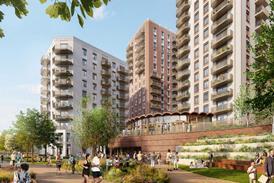Stamp duty and council tax ’could play key role in helping UK meet its net zero commitment’
RIBA president Alan Jones has accused the government of “failing to grasp the scale of the problem” as it brings its troubled Green Homes Grant scheme to an abrupt halt.

Wholescale reform of the taxation system is required to incentivise well-off owners to retrofit their homes if 20 million properties are to be brought up to standard, he said.
The RIBA is calling for a national retrofit strategy and a sliding scale of stamp duty, capped at £25,000, with the most energy-efficient homes accruing significantly less tax than the least energy efficient.
Business secretary Kwasi Kwarteng announced the Green Homes Grant scheme, which spent just a fraction of the £1.5bn allocated to it in the first six months of its operation, will close to new applications from tomorrow.
The decision, which the Department for Business, Energy and Industrial Strategy (BEIS) said followed a “review”, comes just a week after MPs criticised the government for its mismanagement of the scheme.
The government said it was instead making an extra £300m available to local authorities to undertake energy efficiency upgrades. It was not immediately clear if that was on top of the £562m pledged last week for the same purpose.
Jones said he was disappointed to see the government scrap the Green Homes Grants scheme without committing to long-term energy efficiency investment.
“While the scheme was clearly mismanaged, we must bring an end to this stop-start cycle of second-rate retrofitting policy,” he said.
“We need a comprehensive national retrofit strategy with adequate funding and a clear roadmap for action. I hope that there will be lessons learnt from this debacle.”
He added: “The additional funding pledged this week and the focus on low-income homes must be welcomed, but I’m concerned the government fails to grasp the scale of the problem – at least 19 million UK homes requiring retrofitting.”
The institute said money alone would not help. “Policymakers must also provide incentives for those ‘able to pay’ to update their own homes,” said Jones. “By reforming property taxes such as stamp duty and council tax, the government can help accelerate this urgent programme.”
Figures from BEIS show it is on course to have spent just £300m by the time of its closure. Implementation of the scheme was described as “disastrous” by MPs on the Environmental Audit Committee last week.
The government had already said that unspent cash would not be rolled over into next year.
Overall, the Green Homes Grant had £3bn allocated to it over two years, following its initial announcement last summer and the government’s decision to extend it in November.

Julie Hirigoyen, chief executive of the UK Green Building Council (UKGBC), said she had been left speechless by the decision which comes in the year the UK is hosting the COP26 talks and just days after the audit committee’s warning that to meet the UK’s legally binding target to be net zero carbon by 2050, urgent action was needed to improve the energy efficiency of homes this decade.
“Slashing more than £1bn in funding for energy efficiency is an absolute travesty, for households wanting to take action and for businesses trying to plan ahead, and has created yet another roadblock for decarbonising the country’s 29 million homes,” she said.
“With a stream of crucial policies coming down the pipeline for construction and property in the next few months and years, lessons must be learnt as soon as possible and these mistakes not repeated,” she added.
>> Thomas Lane: Government’s Green Homes Grant fiasco is either bumbling incompetence or callous disregard
>> Julia Park: A green homes revolution or total mayhem?
“Government is now emphasising the role of local authorities in delivering retrofit and there is absolutely no doubt that they have a key role to play. But they need the certainty of a national retrofit strategy within which to operate locally, and they need to be given financial support and the freedom to innovate. Retrofit has a clear role to play in both levelling-up and driving a green-recovery at the local level, but this requires a genuine partnership approach.”
Environmental groups have already described the grant scheme as woefully insufficient to address the scale of the challenge needed. The cost of improving the energy efficiency of the UK housing stock is estimated to run in to tens of billions of pounds.
Brian Berry, chief executive of the Federation of Master Builders, said the “misguided” scrapping of the Green Homes Grant sent the wrong message to consumers and builders, and “will harm the UK’s desire to be seen as a global leader in tackling climate change”.
He said the government should instead have addressed the flaws in the scheme, branding it “another example of a stop-go green initiative that undermines, rather than creates, certainly for both the public and installers”.

















No comments yet